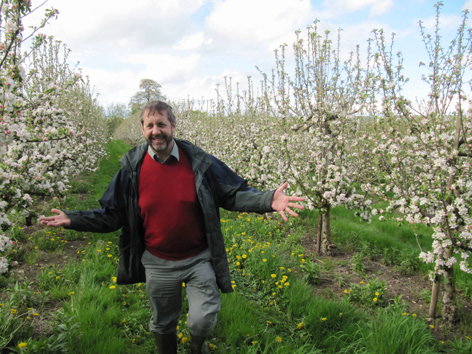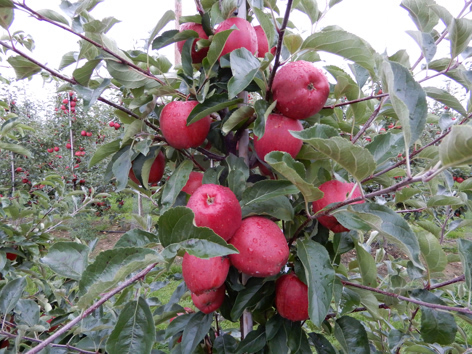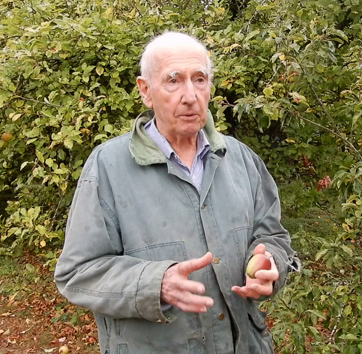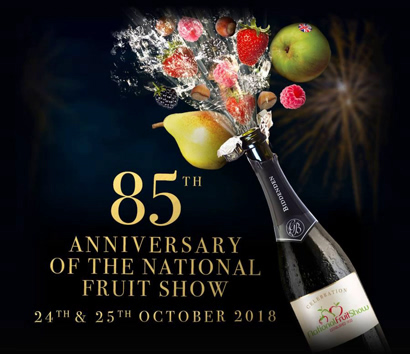

Another year passes and it will soon by 2019!
The English Apple Man reflects of significant events in 2018 by looking through the Journals posted on-line from January 2018 - December 2018 and extracting significant passages.
![]() Last January, The English Apple Man drew on his top fruit industry colleagues for an indication of what the major influences would be in 2018..........
Last January, The English Apple Man drew on his top fruit industry colleagues for an indication of what the major influences would be in 2018..........
A Quote: "Refers to industry colleague statements" ..... EAM: Refers to The English Apple Man's comment
Quote: "What I hear from most growers at present is the concern surrounding the ever decreasing pool of available overseas workers and the future of the SAWS scheme.
EAM: This refers to the Seasonal Agricultural Workers Scheme (SAWS) - which used to regulate the labour requirements for harvest work in the UK: See SAWS Published 12 September 2013 The government brought SAWS to an end; based on Romania and Bulgaria becoming members of the EU, in anticipation of adequate available migrant harvest workers.
Quote: Without sufficient pickers, the volume of apples being picked at the optimum time for long term storage will reduce. Storage potential of late picked fruit will be adversely affected and there is a danger that some fruit is picked so late that it has to be marketed very quickly.
EAM: Brexit is taking the blame for most anticipated challenges......but its not all about Brexit........
Quote: Brexit Impacts:
- Labour availability and quality for harvesting and Packhouse operations.
- Increases in minimum wage and reluctance of retailers to pass on the costs to customers.
- Increases in automation in factories - less labour, more robots.
- Pesticide registrations
- Pesticide regulation harmonisation.
- Export opportunities but we need trade agreements in place.
December 2018 Comment: The harvest labour issue continues, with shortages felt in 2018. Government have sanctioned a re-launch of SAWS but only with an allocation of 2,500 - compared with the 80,000 required each season; "a spit in the ocean"
At the annual BIFGA Conference in late January 2018 - Dan Barker - Avalon Produce Ltd (APL) looked at the Challenges of supplying high street retailers.
Dan highlighted the Changing face of the Marketplace; Dan reminded delegates; "The customer is always right" - CONVENIENCE stores are high on the list and while there is strong desire for home produced products, it does not 'come at any price' with so much more consumer choice and strong growth in alternative fruit categories, as an industry we are doing well to maintain the sales volume....
A changing demographic with exposure to the rest of the world, seasonality no longer exists.........it's now a 52 week lifestyle........consistency of supply and an aversion to waste are the key factors....
The old trading mentality is in the past; retailers are working in partnership with their suppliers.........
Driving cost out of the supply chain is paramount......…
Dan drew on the example of New Zealand fruit growers; even with their favourable climate, their customer base has changed from majoring on Europe to Asia and competition dictates the price/quality equation is key.....Asia with it's increasing wealth has 'changed the game' - In many years NZ growers oversupplied the European Market, often with disastrous effects on prices when the last NZ fruit overlapped the start of the European season.
New Zealand production profile has changed dramatically between 2004 and 2017 the production area has dropped by 30% but fruit produced is only 3% down in-spite of the decrease in orchard area. Tonnage per hectare has risen by 49% and the distribution profile; Europe v Asia shows the change in marketing strategy.
Dan, posed the question: "what can we do? - Identify what the customer wants; target the customer(s) that work for your business - communicate with the customer and influence decisions - explain the situation accurately and early - find alternate markets - target the right product to the best market and value - NPD (new product development) - Point of Difference - New varieties eg. Stardance; Cabaret - New methods eg. DCA Storage, New Nursery methods - Keep one step ahead, know the market place - Optimise every opportunity!
The market place today is much more collaborative between suppliers and retailers; a marked change from the 'trading mentality' of the past...…
December 28th 2018 Comment: commercial pressures to take cost out of the supply chain continue; the UK grower base is still reducing with just two large growing businesses supplying more than half the apples sold in UK Supermarkets. Cheap imports are always a temptation for UK retailers! If our industry is to survive, we need pickers and a bit more money for the growers
Developing practical strategies to improve quality and storability of UK apples
 An area of research by Agricultural & Horticultural Development Board named: AHDB 225 which has been identified as a key element of fruit quality and storability is the level of 'dry matter content' in the fruit at harvest time. The level of DMC determines the eating and storing capability of each apple. What exactly is dry matter? The simple answer is everything in the apple minus the water.
An area of research by Agricultural & Horticultural Development Board named: AHDB 225 which has been identified as a key element of fruit quality and storability is the level of 'dry matter content' in the fruit at harvest time. The level of DMC determines the eating and storing capability of each apple. What exactly is dry matter? The simple answer is everything in the apple minus the water.
"Dry matter is the accumulated sugars, cell wall, proteins, and starch that are present in the apple. All of this is derived from the photosynthetic activity in the leaves and enters the fruit as sugar and is subsequently metabolized into storage (starch), enzymes (protein) and/or cell wall material. As the fruit grows and matures it accumulates dry matter," says Peter Toivonen, a postharvest physiologist with Agriculture and Agri-Food Canada.
Dr. Julien Lecourt (NIAB/EMR) presented the latest research progress on AHDB TF 225: This is a five year long project with the first experiments in 2017 looking at improving storage quality and focussing on DM.
Testing for dry matter content is not a new concept. The standard method has been to cut apples into quarters or thin slices, weigh the quarters and dry them in an oven for approximately 48 hours, or until weight loss is no longer detected. The final weight divided by the original fresh weight is the dry matter reading. This testing for dry matter is referred to as "destructive" methods.
December 28th 2018 Comment: Dry Matter Content (DMC) has become more important as we develop storage techniques capable of extending the apple season. Obviously the better the structure of the apple, the longer it will store and 'importantly' continue to deliver a great eating experience
Bees and pollination - 2018
To comprehend the complexities within the bee hive we need to look at the breeding pattern in the early part of the year to understand how well they are tuned into the pollination of our English apples at the beginning of the season to produce the crops we grow.
 Bees store honey and pollen to see them through the winter. Those stores were collected last summer and autumn and with the shortage of blooms and cold weather in the winter they are reliant upon this food to see them through to the spring and the new flowers. Generally, the queen stops laying in mid to late November and starts again in mid January; during this time the bees cluster together for warmth and consume their stores.
Bees store honey and pollen to see them through the winter. Those stores were collected last summer and autumn and with the shortage of blooms and cold weather in the winter they are reliant upon this food to see them through to the spring and the new flowers. Generally, the queen stops laying in mid to late November and starts again in mid January; during this time the bees cluster together for warmth and consume their stores.
The colony is run on a day length time clock. As the days lengthen the queen starts laying more and more eggs and new bees are born. This is a slow process at first but gains momentum as more bees are produced strengthening the hive.
With a late spring, the colony is unaffected by the cold weather providing there are enough stores to support the new brood being produced. The later the spring, the greater the quantity of flying bees that will be available for the fruit blossom.
With the spring of 2018 being late and then followed by a spell of very favourable weather, the early flowers of cherry, pear and plum were held back but the sunshine brought them on very quickly, and the apples suddenly turned from small green shoots to open blooms. The bee populations have therefore been put in a terrific place to be able to pollinate all the flowers which have appeared simultaneously, due to the quantity of flying bees available at this critical time for fruit production.
December 28th 2018 Comment: the bee hive development and it's influence on the pollination of our apples was highlighted by James Salter a 'bee enthusiast' and a friend when we were attending an orchard walk at Sheerlands Farm in May.
At the Produced in Kent seminar held at Canterbury in April 2018, Professor David Hughes gave the delegates an insight into global eating trends
 In days gone by (my youth) we always sat down to eat our meals together - not any more!
In days gone by (my youth) we always sat down to eat our meals together - not any more!
"Do you know that close to half of all eating occasions in the UK and the USA comprise one person eating alone - a morose male tucking into a "Sad Bastard Ready Meal for One" comes to mind. But, that's not so, we're all too busy and, anyway, in most major urban centres of higher income countries 35% or more of households are singletons - Oslo tops the league with 60% of households being solo and helps explain why they are the highest per capita consumers of individual pizzas in the world!
Official statistics on household size are no indication of actual household food eating behaviour, particularly when it comes to millennials. Students and early stage professionals may live together but they certainly don't eat together at home. Sharing the rent is an economic necessity but, invariably, they have a fridge shelf each and, because of frenetic work and social schedules, pass like ships in the night.
Those pesky millennials, why don't they shut up and get a life? Well, by 2025, there will be 2+ billion of them and will account for over 50% of the global work force.
But, not in family-friendly Asia you say?: well, in 2000 less than 50% of 25-29 year old Singaporeans were single and, now, 70+% have that status. It's no different in 21st Century urban China".
The changing demographic of Rural v Urban populations as more move from the countryside to town life: this is a major influence on our outlook on life and eating habits.
December 28th 2018 EAM Comment: "changing demographics, like everything in our world today are changing at an exponential rate" -
In Herefordshire with the Under 40's in July 2018 at Lower Hope Fruit Farm with U40's Chair Emily Cliff
At Lower Hope, following a buffet lunch, U40's 'recently married' Chair Emily Cliff (formerly Livesey) and fruit manager at Lower Hope updated the assembled U40 members on the planning process for the 2019 Under 40's Conference in Chile.
Lower Hope Fruit is part of the 2,000 acre Lower Hope Estate owned by Clive Richards who bought the estate in 1985. Lower Hope Fruit Farm had been a fairly traditional fruit farm, growing apples and still grows Bramleys and Opal apples. Lower Hope is strategically well placed for cherry production as it is the latest cropping site in the country (England) avoiding the UK cherry production peaks.
Cherry varieties grown at Lower Hope: Early - Stella, Summer Sun, Lapins, Sylvia and Colney, followed by Kordia, Karina, Regina, Sweetheart, Skeena, Centennial and Penny.. Some Sweetheart are grown on Gisela 6 but most varieties are on Gisela 5.
Lower Hope employ mainly Romanian and Bulgarian harvest workers, with circa 200 at the peak harvest time.
December 28th 2018 EAM Comment: the main focus for the U40's gathering in Herefordshire was a 'bonding exercise for young growers planning to join the U40 visit to Chile in February 2019.
Speculating on the 2018 season apple crop in July 2018 The English Apple Man wrote:
"This season is proving an uncertain one as far as crop forecasting goes, but it does seem to be a little clearer. In the Journal for 29th June I wrote: "After the frosts in 2017 which caused sporadic damage across the country, this season shows 'knock on' effects. Where the crop was light in 2017 'generally' a good crop predicted this season, and where heavy crops were prevalent in 2017, crop predictions are not quite as good.
However, the 'run off' (natural thinning caused by the tree adjusting to 'as yet' unknown influences - extreme cold and/or extreme heat at critical stages of flower development have been suggested) has been general. Growers pointed out some of the anomalies - Gala (naturally a good cropper) has been observed to have set 2-3 apples per bunch on the upper branches, while 1-2 on the lower branches.
The general consensus appears to be: "we are probably looking at a good crop this year, but NOT a bumper crop"
This week, The English Apple Man popped into a few orchards and observed Cox generally light crop across the tree, but still in need of thinning as many bunches of 5 apples (too many) require thinning down to 2-3 fruits. It's a shame those fruits had not been spread across the tree, rather than in insufficient 'overset' bunches.
In August 2018 The English Apple Man joined fellow fruit growers and industry experts at Burrs Hill farm for the 2018 annual Paddock Wood NFU Branch Orchard Competition walk and presentation of Trophies to class winners.
Below, an extract from Paddock Wood history mentioning Mascalls Court and the Overy family
The Manor of ancient times called 'Marescalls' was recorded in the reign of King Edward II, about 1307.
In the very early days of Paddock Wood when the Rev. Edwin Pope was the vicar, it needed two Church wardens. They were Mr. Charles Overy and Mr. Thomas Fielder Fuggle who were appointed on the 18th November 1860. This was the only Church administration in those days. These two very outstanding Christian personalities carried tremendous responsibility.
They were leading hop growers, Charles Overy farmed at Mascalls Court Farm and Mr. Fielder Fuggle at Fowle Hall just beyond Queen Street. Both are interesting men, Mr. Overy's family predated the present Overy family which itself dates from the 1870's. Mascalls Court Farm at one time reached past the village centre down to the railway.
Fruit size is good at Crouches and Burrs Hill in this 'rain free' summer and Nick explained they have always maintained good soil health strategies; composting is an integrated element of orchard management.
Nick said Mascalls Court was a Wayleaves Court dealing with 'rights of way' the last Court was held in 1880 when half a dozen farmers sat down in the old granary and decided they footpath was no longer needed, so that ended the Wayleaves Court at Mascalls Court. the family was religious and 'teetotal' - but that changed!
Today the family farm the three farms; Burrs Hills was bought in 1986 and they now grow about 10 hectares of apples - 'all Gala' on the three farms. At Crouches it's Mondial Gala (old trees) at Burrs Hill Gala Galaxie apart from one orchard of Royal Beaut and the one Gala Galaxie orchard at Mascalls Court which grew 70 tonne per hectare in 2017 and looks set to repeat that this year.
Gala Club 2018
 Gala is a growers apple: it crops heavily, delivers a good yield even in the most difficult season: it is easy to prune and stores well and now with an extensive understanding of the variety, it can be stored into early summer 'displacing' imported fruit in favour of 'home grown' apples.
Gala is a growers apple: it crops heavily, delivers a good yield even in the most difficult season: it is easy to prune and stores well and now with an extensive understanding of the variety, it can be stored into early summer 'displacing' imported fruit in favour of 'home grown' apples.
Gala is an attractive apple with bright red colour 'easy on the eye' - the texture is 'forgiving' - crisp and juicy without the dense texture of some varieties e.g. Braeburn which makes it the ideal apple for young children.
Gala One - a natural sport of Gala Royal Beaut. which matures earlier than other Gala sports.
Yields on trees in their 2nd leaf (2nd year growing) are stunning: Gala One @ 35 tonnes ha on the best trees, 19 tonnes ha on Cox Lavera and 15-20 tonnes ha on Conference pears. Asked what yields are being achieved on the older orchards in East Kent, Piotr said 50 tonne ha on Conference in 3rd leaf and he expects 60 tonne when Conference settle into full cropping. Piotr visited Conference growers in Holland and Belgium this summer and was pleased to see identical growing systems achieving 65 tonnes ha 'year on year' -
While the latest orchards are exciting, older varieties and tree systems are equally interesting
 On a Thursday in September, I drove to Wytham (near Oxford) to meet my friends Barrie Juniper and Sean Morris: Sean was twice a member of the winning crew for Oxford back in 1963 & 1965. Barrie wrote the Story of the Apple following his visit to the Tian Shan 'fruit forests' in conjunction with David J. Mabberley.
On a Thursday in September, I drove to Wytham (near Oxford) to meet my friends Barrie Juniper and Sean Morris: Sean was twice a member of the winning crew for Oxford back in 1963 & 1965. Barrie wrote the Story of the Apple following his visit to the Tian Shan 'fruit forests' in conjunction with David J. Mabberley.
Barrie, a professor at Oxford was Sean's lecturer when he was at Oxford University in the 1960's.
Barrie has around 50 varieties in his orchard: Orlean's Reinette an old French variety introduced in the 1770's with good flavour and an apple he describes as Ladies Finger of Bedlington, not a good eat but used as a decorative apple. Newton Wonder (my grandfather planted some in the 1930's). Leather Coat which Barrie describes as 'Shakespeare's Apple' - Brownlees Russet and Royal Russet (Brogdale Collection identifies them as one variety e.g. synonyms!
December 18th 2018 EAM Comment: "I am privileged to know Barrie and marvel at his knowledge of the history of apples. His orchard at Wytham is modest by comparison to what he found in the Tien Shan fruit forests, but fascinating, nevertheless!
 2018 celebrated the 85th anniversary of the National Fruit Show
2018 celebrated the 85th anniversary of the National Fruit Show
"This week the Marden Fruit Show Society (MFSS) held the 85th Anniversary National Fruit Show at The Kent Event Centre at Detling".
The Marden Fruit Show Society (MFSS) is a Registered Charity run by a voluntary committee who represent many different facets of the fruit industry. The aim of the Society is to promote the better growing, grading and marketing of fruit.
The Society organises the National Fruit Show, which acts as a meeting place for the industry. The centrepiece of the show, held each October, is the largest competitive display of commercially grown top and soft fruit staged in the UK.
How will climate change influence the growing and cropping conditions in our UK orchards? In October 2018 Helen Whatley MP formally opened the climate change research project at Brogdale Farm
Below: Helen Whatley MP
Professor Paul Hadley said we know a lot about the past and the change in climate to date: what we need to find out is the probability for future change in the climate. Over the 40 year life of the Fruit Collection the temperature has risen across a year and the flowering date for the whole collection (average) is now 17 days earlier than back in the 1960's
So rather than looking back, we are planning to look forward and try to project the influence on our trees over the next 50-60 years. So we have 3 multispan tunnels. with one at ambient, one at 2c above ambient and one at 4c above ambient.
We are fortunate to benefit from advances in technology: for instance Haygrove Tunnels created an automatic venting system which opens and closes the window/vents in relation to the ambient temperature curve.
Within the 3 temperature zones are 3 irrigation modules, so there are 9 different climate environments.
All the rainfall is collected from the roof of the tunnels via gutters and piped to a large reservoir, the rainfall is measured and the rainfall curve determines how much water is applied to the 3 modules.
Module 1. Normal: The irrigation system delivers water equivalent to the 'rainfall curve' outside delivering water at the same rate as the outside weather pattern.
Module 2. Wet: The second irrigation module delivers 20% more than the 'normal' rainfall.
Module:3. Dry: The 3rd module delivers 20% less water than normal rainfall.
December 18th 2018 EAM Comment: This fascinating and very important research project will give our fruit growers a better understanding of the challenges they face if global temperatures rise in line with forecasts.
In November 2018 The English Apple Man joined a group of 20 growers visiting the biennial Interpoma Apple Show in Bolzano in the South Tyrol. On the way back to the airport at Verona, we visited a frut tree nursery
Below: Inspecting trees in the nursery at GRIBA
GRIBA is the largest Tree Nursery in South Tyrol and annually produces over two million trees of excellent quality! GRIBA also operate a Consulting & Service as well as the production of apple, cherry and pear trees of excellent quality, GRIBA works as a consultant in the planning, implementation and management of orchards.
BUT the big story of the week was our visit to Griba nurseries near Verona on Friday morning. After close inspection of the very high quality trees in the nursery, The English Apple Man organised a picture of our group with Andreas the nurseryman - however, while moving backwards slightly to ensure everyone was 'in frame' my footing suddenly loosened and next thing I was flying backwards into a fast moving canal; with camera in hand, iphone on pocket and 'man bag; containing passport etc around my neck I hit the water, vanished beneath the water before emerging and ushered to the bank by Christian (Chris) Levett who had jumped in to my rescue as soon as I hit the water!!!!
Thanks to Chris I was not in the water long enough to feel fear, but from the moment I emerged was overcome with embarrassment!!!!!!!!!!!
I wish all my readers a Very Happy, Healthy and Prosperous New Year ![]()
Take care
The English Apple Man